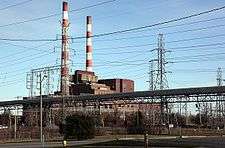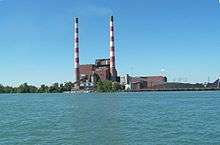Trenton Channel Power Plant
| Trenton Channel Power Plant | |
|---|---|
 | |
 Location of Trenton Channel Power Plant in Michigan | |
| Country | United States |
| Location |
4695 West Jefferson Avenue Trenton, Michigan 48183 |
| Coordinates | 42°07′20″N 83°10′53″W / 42.12222°N 83.18139°WCoordinates: 42°07′20″N 83°10′53″W / 42.12222°N 83.18139°W |
| Status | Operating |
| Commission date | 1924[1] |
| Owner(s) | Detroit Edison |
The Trenton Channel Power Plant, also known as the Trenton Stacks, is a coal-burning power station located in Trenton, Michigan. Completed in 1924, it is owned and operated by Detroit Edison, a subsidiary of DTE Energy.
Location
Part of the facility's property is on the mainland surrounding West Jefferson Avenue in southern Wayne County. The main building – the two-smokestack power station – and the coal yard are located on what is now technically the southern portion of Slocum's Island in the Detroit River. The facility shares this island with Elizabeth Park, which is separated from the facility by Grosse Ile Parkway. The Trenton Channel Power Station and the affiliated Sibley Quarry occupy 458 acres (185 ha) of land along the Detroit River, in which 225 acres (91 ha) of that property is open fields, woods, ponds, and sound berms.[2]
Environment
The characteristic striped smokestacks were constructed with an innovative “smokestack within a smokestack” design to reduce the level of pollutants released. However, to better achieve this, the inner smokestacks were lined with asbestos that had to be later removed at great cost.[3]
Despite its nature, the power plant works closely with environmental organizations to ensure the area is free of pollutants.[4] Committed to reducing pollution and preserving the environment around Elizabeth Park, the Trenton Channel Power Plant became ISO 14001 certified in 2001. In 2002, the facility was designated a corporate wildlife habitat by the Wildlife Habitat Council.[5] For their efforts, the Trenton Channel Power Plant and Sibley Quarry were co-awarded the Wildlife Habitat Council's Corporate Habitat of the Year award in 2004.[2] The Trenton Channel Power Plant has also donated money and worked closely with Elizabeth Park and the Wayne County Department of Public Services for continued ecological preservation.[6]
DTE Energy spreads crushed limestone along the banks of the Detroit River on Slocum's Island, because such an item provides a popular nesting habitat for native common terns. Common terns were once plentiful in the region before industrialism drove out all but a small number of them. The banks of the Detroit River near the Trenton Channel Power Plant are one of the only places in the region where common terns regularly nest and breed.[2][4] Other birds, such as bald eagles, peregrine falcons, and great blue herons also use the grounds for habitat.[2]
History
The Trenton Channel Power Plant was first fired up in 1924. It had 6 turbine generators with 13 coal-fired boilers. There was space for 2 additional boilers, but they were never needed. Operating conditions were 725 °F and 420 psi. The sixth and last turbine generator arrived by 1929. Each unit produced a rated 50 megawatts of electricity. Five short smoke stacks exhausted gases from the boilers. These were the first Detroit Edison units to use pulverized coal rather than the older style stoker-fired beds of coal. They were also the first power plants in the US to use electrostatic precipitators to capture fly ash from the stacks. Electrostatic precipitators were, however, in use in other industries at the time.[1]
In 1950, a second plant started up at the same site and adjoined the first plant. It had two turbine generators, #7 and #8, with a rating of 120 megawatts each. They were fed by a total of 4 boilers. The boilers ran at higher steam conditions than the first plant, at 950 °F and about 1250 psi. Therefore, the first plant became known as the "low side", while the newer plant was known as the "high side". The high side was located to the south of the low side. Two short smoke stacks released gases from the four boilers.[1]
Finally in 1968, Unit #9 was placed in service. It is a 550-megawatt turbine generator fed by a single boiler. It adjoins the high side plant and is located on the south side. Operating conditions are 1000 °F and 2520 psi. One 563-foot-tall smoke stack is used for this unit. Soon afterwards, another stack, identical to the #9 stack, was erected to replace the two short stacks on the high side plant. Both tall stacks remain in service as of 2012.
Decommissioned
By the mid-1970s, the low side plant was decommissioned and the boiler house was eventually demolished.

References
- 1 2 3 Miller, Raymond (1957). Kilowatts at Work, A History of The Detroit Edison Company. Detroit, Michigan: Wayne State University Press. p. 467.
- 1 2 3 4 Wildlife Habitat Council (July 2005). "A Portfolio of DTE Energy's Activities with the Wildlife Habitat Council" (PDF). Retrieved March 15, 2010.
- ↑ GLOBAL Encasement, Inc (2009). "112 - Detroit Edison, Trenton Channel Power Plant". Retrieved March 15, 2010.
- 1 2 Cooperative Conservation America. "DTE Energy Trenton Channel Power Plant". Retrieved March 15, 2010.
- ↑ DTE Energy (2010). "Environmental Policies for Detroit Edison Facilities". Retrieved March 15, 2010.
- ↑ U.S. Fish and Wildlife Service (12 May 2007). "Dedication of Wildlife Observation Deck at Humbug Marsh". Retrieved March 15, 2010.
External links
- EPA Facility Detail Report for the Trenton Channel Power Plant